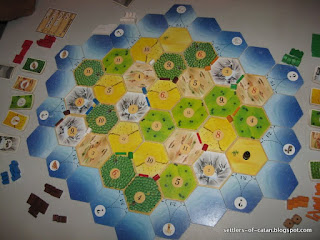There were quite a few nice starting spots in this game, with reasonable numbers and a selection of resources. I got to go last, yet again, since Sheila - who was sitting on my left, playing brown - managed to roll a 12. So she took the obvious 5-6-9 intersection, with clay, wood and wheat. Jörn (blue) who sent second, then took the 5-8-10 with good access to ore, wheat and wood. Richard (red) was third; he opted for a 4-5-10 intersection, aiming to reach a 3:1 harbour as soon as possible. Becky (white) took yet another good spot, with clay, wood and wheat on a 4-9-10 intersection, and Daniel (green) took a 3-8-9, also heading for a 3:1 harbour.
At last it was my turn - and I was quite pleased to be able to a range of six numbers (3, 4, 5, 6, 8 and 9) with all five resources, potentially (albeit only 3 on ore) AND the sheep harbour, which I hoped would be useful as I had two sheep hexes.
On the way back, everyone took the spots they could with the resources and numbers they wanted; Becky was mildly annoyed to realise that she only had four different numbers rather than six, and no access to sheep at all. Jörn, likewise, had no access to sheep in his initial placement, but was heading towards sheep with one of his streets.

I grabbed my sheep harbour as quickly as I could; Richard and Daniel, likewise, grabbed their intended 3:1 harbours. Sheila and Becky built some more streets... and Jörn built two cities.
I've no idea why the next photograph is sideways... I should have corrected it before uploading. But perhaps it provides a bit of variety...

The game continued with various interruptions, making it quite slow-moving. But it didn't matter; part of the enjoyment of a board game like this is the interaction and discussions amongst the players.
Jörn finally managed a settlement, which he was quickly able to upgrade to a third city. Sheila and Becky managed cities, and Sheila - without realising it - built the longest street. I was struggling with my lack of ore - always a problem - and Richard got blocked by Daniel:

So at that stage, Sheila was in the lead with seven points, although she didn't expect to keep the longest street card. Jörn and Becky both had six points, I had five, Daniel had four, and Richard had three.
Daniel took the next photo, from the other side of the board, which is perhaps even more confusing than a sideways one:

Becky now had eight points on the board - she was doing very well despite her lack of starting numbers, and no 6s or 8s - although she had managed to reach an 8-wood hex by this stage. Sheila was still holding the longest street card, so also had eight points. Jörn had managed another settlement, so had seven; I had finally succeeded - by dint of a lot of trading - to build a city, so had six. Daniel had five, and Richard had four.
Then Jörn linked his two sets of streets, and took the longest road card from Sheila. That put him in the lead, with nine points. Becky was right behind, with eight:

The game was still fairly close, however. Sheila now had seven points, Daniel and I each has six, and Richard was trailing with four. With rarer numbers on both clay and ore, there wasn't much that he could do.
Becky, however, went from strength to strength. She picked up cards, and did more building, so that suddenly we realised she was in the lead, with ten points:

Richard was still having a hard time, but decided to aim for the longest street, so started building roads whenever he could. I wasn't really getting the resources I needed, despite my good numbers. Jörn had run out of building spots, and somehow wasn't getting the resources he needed for his final city.
Richard achieved the longest street, which did give him six points. I managed one more settlement, putting me on seven (I also had a hidden victory point card). Jörn was still stuck on seven, having lost the longest street, and Daniel also had seven. Sheila was doing a bit better with nine... although we think she somehow managed to miss a turn as we were so distracted in this game.
Then Becky's turn came around, and she built another settlement, and produced a victory point card. So she was the clear winner, with 12 points:

My small friend Helen, who usually plays on my 'team' (and is getting better and better at recognising the different pieces and resource cards, has become quite attached to Daniel and Becky too, and posted with Becky for the winner's photograph:

















































